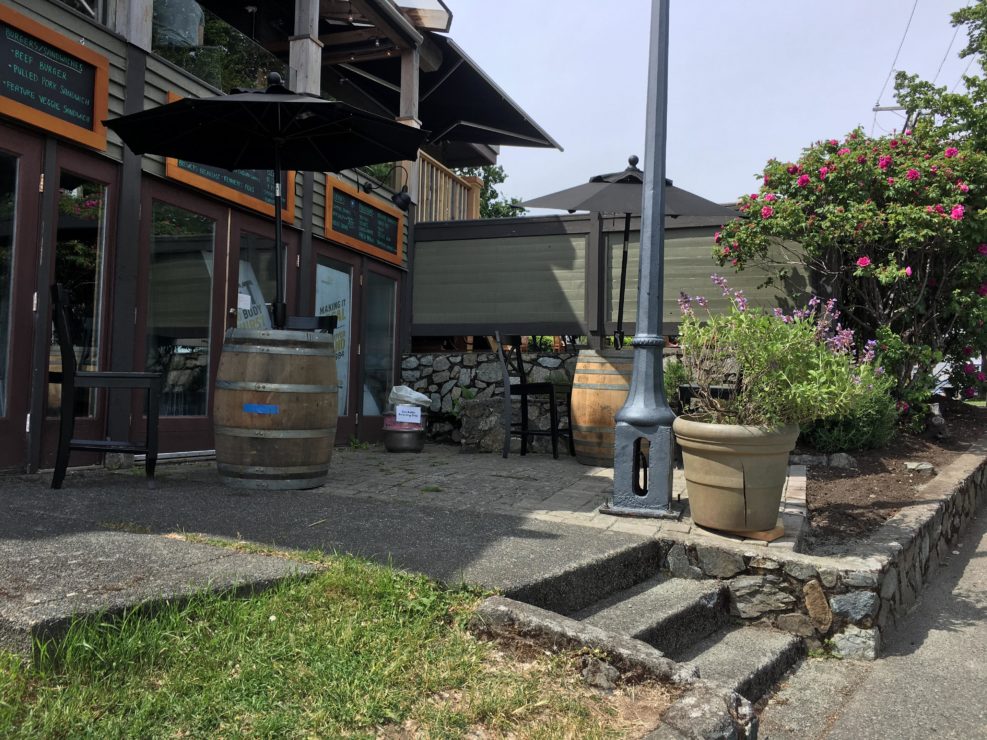Public spaces to be transformed into patios and retail space

On May 19, B.C. officially entered into Phase 2 of the province’s Restart Plan. This means that businesses in the retail, service, and hospitality industries are now allowed to open, albeit at a reduced capacity. In preparation for this transition, Victoria City Council unveiled an Open Air Recovery Plan which, once implemented, will allow businesses to sell their products and set up patios in public spaces such as “squares, plazas, and streets.” The Council hopes that this plan will help aid economic recovery while also following public health guidelines.
According to Victoria City Councillor Jeremy Loveday, who sponsored the motion along with Mayor Lisa Helps, the push for the Open Air Recovery Plan came from hospitality industry groups across the province, and has received support from local businesses as well as citizens who are anxious for the return of a sense of normalcy.
“The idea of expanding outdoor patios for the summer came from residents and local businesses who thought that this would be an exciting opportunity to throw a lifeline to businesses…to help them get through the summer, and also provide a safer way for local residents to enjoy our small businesses, restaurants, and other establishments,” Loveday said in an interview with the Martlet. “[This motion] received much public support from people who were excited to be able to get to go downtown and into the village centres and frequent their favourite restaurants, and cafes, and other establishments while safely having physical distance.”
Other initiatives introduced by the Council to aid COVID-19 safety and recovery include the expansion of sidewalks to better allow pedestrians to maintain physical distancing, the rezoning of commercial loading zones after 4 p.m. to give businesses more space to operate, and the limiting of vehicle traffic in Beacon Hill Park.
Although many businesses have been negatively impacted by the COVID-19 pandemic, the hospitality industry especially is facing a significant crisis due to disruptions caused by the pandemic. On May 7, a letter was sent to municipalities across the province by the BC Restaurant and Foodservices Association, Alliance of Beverage Licensees, BC Craft Brewers Guild, and the BC Wine Institute, which outlines the challenges faced by these businesses as they attempt to re-open following months of closure or limited operation.
The letter states that 121 500 jobs have been lost in the restaurant sector alone, with 50 per cent of restaurants facing bankruptcy by June and 10 per cent already closed for good. As for breweries, which make up a substantial portion of Victoria’s hospitality industry, revenues have been reduced by 80 per cent due to the closure of all 197 tasting rooms across the province.
The signatories’ main recommendation, which is included in the Open Air Recovery Plan, is that municipalities should create and expand patio space, as well as permit dining, liquor service, and manufacturer’s sampling in public spaces. These recommendations have also been adopted by the City of Vancouver, which has directed city staff to look at how patios can be developed, expanded, and permitted to support the economic recovery of the hospitality sector.
When asked about the benefits of expanded patio space, Loveday pointed to their ability to increase the capacity of restaurants and bars which will bring in much-needed revenue.
“We know that restaurants are opening at lesser capacities than they would normally have, and they also operate with very thin margins, so this will hopefully allow establishments to have more seating and get closer to the capacity they’re used to operating at,” said Loveday.
Details of how this motion will be implemented are currently sparse. According to Loveday, it is still unclear which public spaces will be used, and whether any streets will be closed to vehicle traffic. However, he said that city staff are working to develop options for the Council which should be ready by early June.
“I specifically didn’t name any locations within the motions,” Loveday said. “I wanted our staff from across departments, everybody from the staff in the business hub, to our engineers who deal with streets and roadways, and our staff who work on accessibility issues, to all weigh in to bring back the best options for us.”
“I look forward to what staff bring back … and how we can move forward to increase vibrancy and make sure that everybody is following the health and safety guidelines, which always has to be paramount.”






